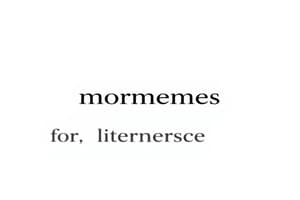Podcast
Questions and Answers
What is the primary function of affix morphemes?
What is the primary function of affix morphemes?
- To carry the primary meaning of a word
- To modify the meaning of a root morpheme (correct)
- To indicate the grammatical category of a root morpheme
- To stand alone as separate words
What is the term for the combination of a root morpheme with one or more inflectional morphemes to form a new word?
What is the term for the combination of a root morpheme with one or more inflectional morphemes to form a new word?
- Derivation
- Inflection (correct)
- Compounding
- Morpheme classification
What type of morpheme is the suffix '-ful' an example of?
What type of morpheme is the suffix '-ful' an example of?
- Derivational Morpheme (correct)
- Inflectional Morpheme
- Free Morpheme
- Bound Morpheme
What is the term for the smallest unit of language that carries meaning?
What is the term for the smallest unit of language that carries meaning?
What is the term for the combination of two or more root morphemes to form a new word?
What is the term for the combination of two or more root morphemes to form a new word?
What type of morpheme is the prefix 'un-' an example of?
What type of morpheme is the prefix 'un-' an example of?
Flashcards are hidden until you start studying
Study Notes
Morphemes
Morphemes are the smallest units of language that carry meaning. They are the building blocks of words and are used to convey grammatical, lexical, and semantic meaning.
Types of Morphemes:
- Free Morphemes: These are morphemes that can stand alone as separate words. Examples: run, dog, happy
- Bound Morphemes: These are morphemes that must be combined with other morphemes to form a word. Examples: -ed, -ing, un-
Morpheme Classification:
- Root Morphemes: These are the core of a word and carry the primary meaning. Examples: run, dog, happy
- Affix Morphemes: These are bound morphemes that are attached to root morphemes to modify their meaning. Examples: -ed, -ing, un-
- Inflectional Morphemes: These are affix morphemes that indicate grammatical features such as tense, case, or number. Examples: -ed (past tense), -s (plural)
- Derivational Morphemes: These are affix morphemes that change the meaning or grammatical category of a root morpheme. Examples: -ful (changes a noun to an adjective), -ly (changes an adjective to an adverb)
Morpheme Combination:
- Compounding: The combination of two or more root morphemes to form a new word. Examples: bookshelf, toothbrush
- Derivation: The combination of a root morpheme with one or more affix morphemes to form a new word. Examples: unhappy, running
- Inflection: The combination of a root morpheme with one or more inflectional morphemes to form a new word. Examples: runs, dogs
Morphemes
- The smallest units of language that carry meaning, serving as the building blocks of words.
Types of Morphemes
- Free Morphemes: Standalone words that carry meaning, such as "run", "dog", and "happy".
- Bound Morphemes: Morphemes that must be combined with other morphemes to form a word, such as "-ed", "-ing", and "un-".
Morpheme Classification
- Root Morphemes: The core of a word, carrying the primary meaning, such as "run", "dog", and "happy".
- Affix Morphemes: Bound morphemes attached to root morphemes to modify their meaning, such as "-ed", "-ing", and "un-".
- Inflectional Morphemes: Affix morphemes indicating grammatical features like tense, case, or number, such as "-ed" (past tense) and "-s" (plural).
- Derivational Morphemes: Affix morphemes changing the meaning or grammatical category of a root morpheme, such as "-ful" (changes a noun to an adjective) and "-ly" (changes an adjective to an adverb).
Morpheme Combination
- Compounding: Combining two or more root morphemes to form a new word, such as "bookshelf" and "toothbrush".
- Derivation: Combining a root morpheme with one or more affix morphemes to form a new word, such as "unhappy" and "running".
- Inflection: Combining a root morpheme with one or more inflectional morphemes to form a new word, such as "runs" and "dogs".
Studying That Suits You
Use AI to generate personalized quizzes and flashcards to suit your learning preferences.




